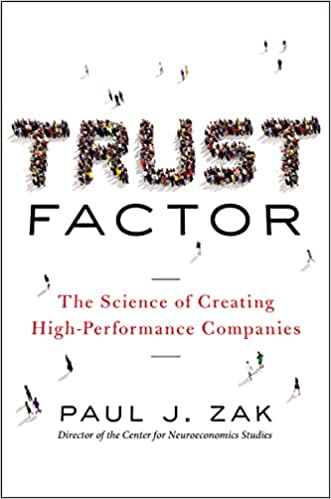Book Review by Taylor Berrett
Where does a great team start? Is it at the hiring stage? Or maybe it begins with the culture that an organization outlines well before the hiring process begins. Or maybe it’s later, in the day-to-day interactions of that team.
If you ask the author of Trust Factor: The Science of Creating High-Performance Companies, great teams begin somewhere else entirely. They begin in the brain.
Paul J. Zak’s book teaches us that cultivating a workplace where trust, joy, and commitment compound naturally is all about cultivating those mindsets inside of each of our brains. In a world where business leaders and team leaders everywhere equip themselves with every possible book, program, process, and philosophy they can find to get their teams to coalesce into perfect synergy, many are still struggling with toxic cultures and unhappy employees who are unproductive and frustrated. Why?
If you ask Zak, a neuroscientist and researcher, the answer lies in our brain chemistry. He believes— and argues convincingly in Trust Factor – that innate brain functions hold the answers to all our questions about teams in the workplace. He writes that “the key to providing an engaging, encouraging, positive culture that keeps your employees energized is trust. When someone shows you trust, a feel-good jolt of oxytocin surges through your brain and triggers you to reciprocate.”
An Expert on Trust in the Workplace
Paul Zak is a Professor of economics, psychology and management at Claremont Graduate University and is ranked in the top 0.3% of most cited scientists with over 170 published papers and more than 19,000 citations to his research. Paul’s two decades of research have taken him from the Pentagon to Fortune 50 boardrooms to the rainforest of Papua New Guinea. Along the way he has helped start a number of interdisciplinary fields including neuroeconomics, neuromanagement, and neuromarketing
In Trust Factor, Zak shows us the way brain chemicals affect behavior and how to stimulate feelings of trust in employees – as well as the reasons why trust so often gest squashed. He shows us that you can create a perpetual trust-building cycle between your management and staff, putting a stop to stubborn workplace patterns that haven’t responded to the same ineffective strategies and programs from improving culture.
The Bottom Line
It’s time we all stopped focusing on team lunches and bowling trips, surface-level perks or trendy culture boosters. While these can all help contribute to a positive team environment, the root of effective teams begins in the way our brains process the world around us— and the people who occupy that world. If you want to understand the science of great teams, start with the science of the brain. That’s what Paul Zak teaches us to do in Trust Factor.





